Skill enhancement is paramount for professional growth. Companies recognize this need and leverage specialized tools known as “Corporate Learning Management Systems” (LMS) to empower their workforce.
These systems serve as effective guides, facilitating a seamless learning experience for employees. By ensuring access to relevant knowledge, LMS enhances job proficiency. In the corporate world, having intelligent, well-educated, and experienced personnel parallels having a team of high-performing individuals driving business expansion and customer satisfaction.
What makes this approach even more compelling is the simplicity it introduces. Instead of intricate training programs or confidential databases, companies are adopting Corporate LMS as tailored solutions. These LMS platforms are designed to assist companies in fostering continuous learning and development without excessive time or financial investment.
According to a Fortune Business Insights report, the global LMS market is projected to reach $40.95 billion by 2029, underscoring the transformative influence of these platforms.
Eager to know more about this subject? Our blog is your ultimate resource, providing a thorough exploration of corporate LMS.
In this blog, we’ll explore the most common types of these systems, and highlight their main benefits. Additionally, we’ll tackle a crucial question: Is it better to use systems that already exist or to invest in creating a customized learning management system? Come along on this insightful journey with us without delay!
What is a Corporate Learning Management System?
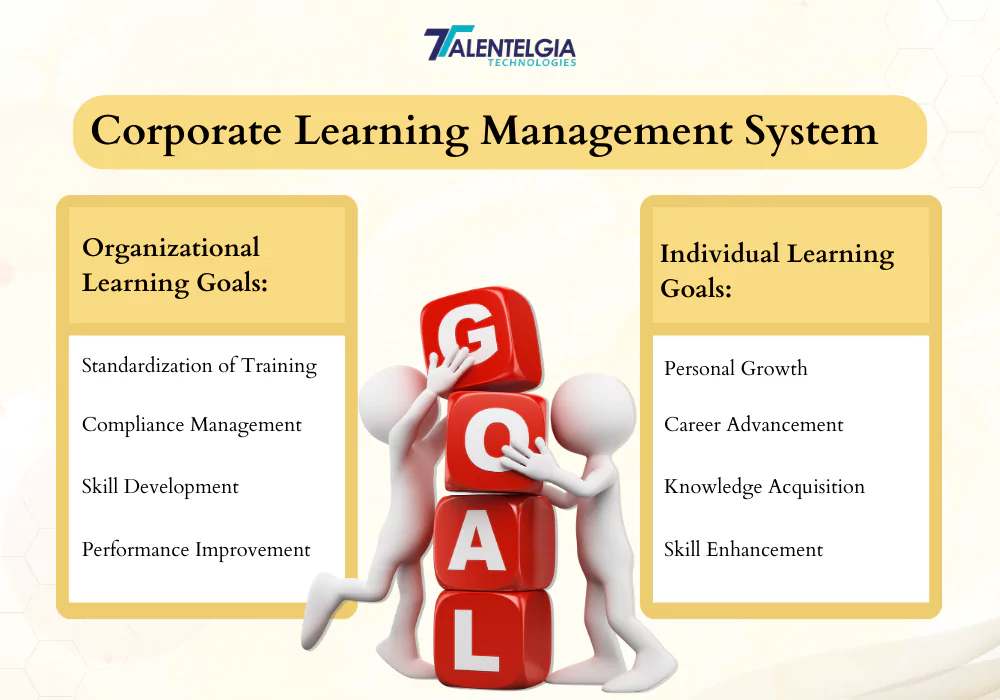
A corporate learning management system stands as a learning platform tailored to assist organizations in overseeing and advancing their educational and training endeavors. LMS development services specifically cater to enterprises’ educational requirements by furnishing an array of features and functionalities that bolster learner management, content dissemination, and training administration.
Moreover, corporate LMS platforms frequently integrate content creation tools, simplifying the provision of user-friendly and interactive e-learning resources. Robust reporting and analytics tools furnish invaluable insights into learner performance, course completion rates, and pertinent metrics, empowering administrators to evaluate training efficacy and pinpoint areas necessitating refinement.
Fundamentally, the primary aim of corporate LMS systems revolves around streamlining and optimizing training procedures within organizations. Through the utilization of corporate LMS systems, organizations can ensure strategic workforce training, augment employee performance, and propel their business toward a more promising horizon.
Benefits of Corporate LMS
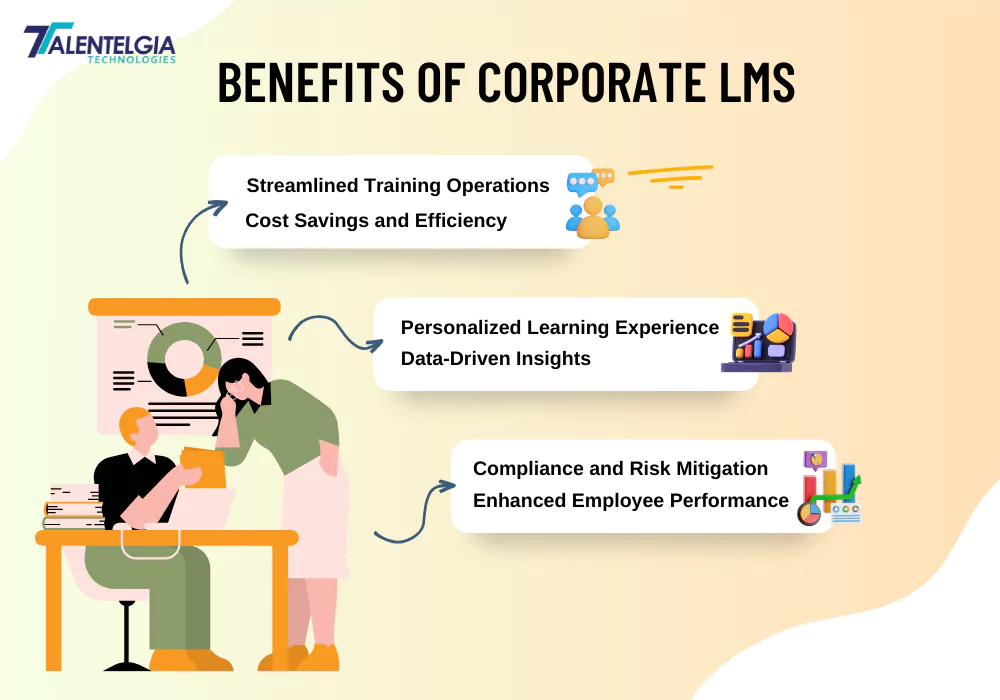
In a competitive modern business era, the pursuit of continuous learning and development stands as a cornerstone for organizational success. Embracing the transformative capabilities of a Corporate Learning Management System (LMS) has become essential for companies aiming to fortify their workforce with dynamic skills and knowledge. Beyond mere training facilitation, these platforms offer a spectrum of advantages that streamline operations, empower employees, and elevate the learning experience.
Let’s explore the 6 primary benefits a Corporate LMS brings to organizations today.
Streamlined Training Operations
A Corporate LMS consolidates learning resources, simplifying the administration, delivery, and management of training initiatives. It centralizes learning materials, ensuring easy access and consistency across diverse learning modules, courses, and departments. This streamlining optimizes the overall training process.
Cost Savings and Efficiency
Implementing a Corporate LMS reduces expenses associated with traditional training methods. It minimizes costs related to printed materials, venue rentals for physical sessions, and travel allowances. Moreover, it saves time by enabling self-paced learning, and reducing work interruptions for training.
Personalized Learning Experience
LMS platforms offer tailored learning paths and content customization based on individual learner needs, job roles, or skill gaps. This personalized approach ensures that employees receive relevant and targeted training, enhancing engagement and knowledge retention.
Data-Driven Insights
Robust analytics and reporting tools in Corporate LMS systems provide valuable insights into learner progress, completion rates, and performance metrics. These data-driven insights empower decision-makers to evaluate the efficacy of training programs, identify areas for improvement, and make informed adjustments to enhance learning outcomes.
Compliance and Risk Mitigation
For industries with regulatory requirements, LMS platforms ensure compliance by tracking certifications and delivering mandatory training. This mitigates organizational risks by ensuring employees are up-to-date with industry standards and regulations, minimizing legal and operational risks.
Enhanced Employee Performance
Continuous learning facilitated by an LMS enhances employee skills, knowledge, and competencies. This leads to improved job performance, increased productivity, and innovation within the organization. Employees feel more equipped to handle their roles effectively, contributing to overall organizational success.
These benefits collectively contribute to a more efficient and effective learning environment, fostering a culture of continuous improvement, and ensuring that the organization remains competitive and adaptive.
Different Types of Corporate LMS
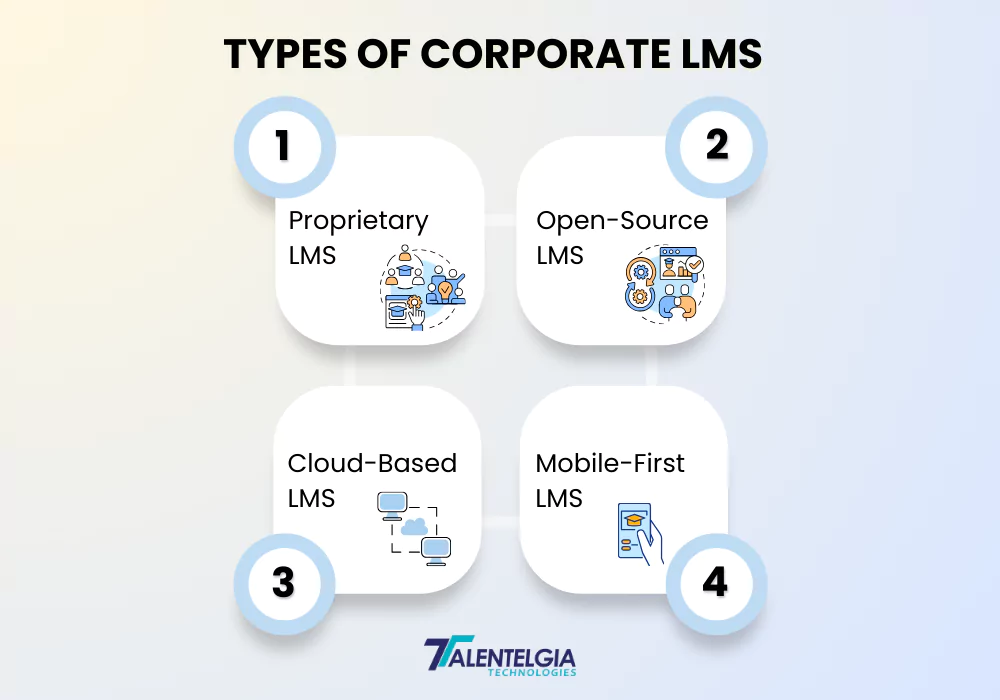
Corporate Learning Management Systems (LMS) vary in two primary ways: through open-source/commercial software and hosting methods – locally hosted or cloud-based Software as a Service (SaaS).
Let’s explore these diverse LMS types briefly.
Proprietary LMS
A Proprietary Learning Management System (LMS) is like a special learning tool owned and developed by a specific company. Unlike open-source LMS, the company keeps the inner workings of the tool private. This means people can’t freely see or change its code.
The company that made the LMS has control over its features and how it’s shared. Users usually pay to use it, and ongoing support often needs payment too. Customizing it might be limited compared to open-source options, as users can’t directly tweak the code. Examples include Blackboard and Canvas, made and maintained by their respective companies. These platforms give organizations a ready-to-use solution for online learning.
Open-Source LMS
An Open-Source Learning Management System (LMS) is like a learning tool where the secret recipe (the source code) is shared with everyone. Unlike proprietary LMS, it encourages teamwork and changes. Organizations can adapt it to their needs, modify features, and work with other software. It’s a team effort, where users can make improvements and share them with the community. Popular ones are Moodle and Sakai, offering affordable and flexible solutions for managing online learning.
Cloud-Based LMS
A Cloud-Based Learning Management System (LMS) is an online platform that stores and shares educational stuff on the internet. Instead of having the tool on a computer, it floats in the “cloud,” letting users access it from anywhere with the internet. This makes it easy to use on different devices like computers, tablets, or phones. Cloud-based LMS often comes with cool features like easy sharing and updates, making it a popular choice for organizations that want efficient and accessible learning.
Mobile-First LMS
A “mobile-first LMS” is like a learning tool designed mainly for phones or tablets. It understands that people mostly use these devices to learn. The design is made to fit small screens and work well with touches. It’s handy for modern workplaces where folks want to learn on the go. These systems offer flexibility, letting learners access courses when it suits them, making learning more convenient and responsive. It recognizes that mobile devices are a big part of our digital world.
Why Should Organizations Use Corporate LMS?
Employees are particularly drawn to training management, Learning Management Systems (LMS), corporate training, and e-learning software for several compelling reasons. They appreciate the flexibility to undergo training at their convenience, often in casual attire, avoiding traditional classroom settings, and finding engagement through interactive online training.
The decision to implement e-learning systems in a corporate setting is typically motivated by tangible cost savings. These savings manifest in reduced expenses such as instructor fees, room charges, and travel expenditures. To provide a comprehensive understanding, here is an exhaustive list of compelling reasons why companies should strongly consider integrating Corporate Learning Management Systems into their workplace:
Training Consistency
A Learning Management System (LMS) ensures uniformity in training delivery, offering consistent quality across all employees. Unlike instructor-led sessions that might fluctuate based on the instructor’s engagement or expertise, an LMS, encompassing both e-learning and instructor-led training, maintains consistent quality. It serves as a singular hub, providing standardized content, related materials, and instructions to all employees, ensuring parity in training standards.
Reporting and Tracking
The LMS empowers organizations to generate comprehensive training reports at both macro and individual employee levels effortlessly. A robust LMS facilitates easy tracking of usage patterns, progress towards goals, knowledge enhancements, and Return on Investment (ROI). It enables organizations to clearly delineate cost efficiencies derived from specific training initiatives, presenting a tangible measure of strategies’ effectiveness.
Measurement of Knowledge Gains
Pre and post-testing mechanisms within an LMS offer the ability to quantify the knowledge acquired through training, providing invaluable insights into learning outcomes and areas for improvement.
Adaptability of Training Materials
An LMS grants organizations the agility to swiftly modify training content, responding promptly to client feedback. It facilitates seamless release of training modules for new product launches and feature updates, ensuring employees are consistently updated with relevant information.
Compliance
The comprehensive reporting capabilities of an LMS furnish organizations with the necessary documentation and evidence to meet legal and regulatory training mandates, ensuring adherence to compliance standards.
Personalized Learning
A well-crafted LMS allows for tailored training experiences, catering to the individual learning needs and preferences of each employee, optimizing engagement and knowledge absorption.
Conclusion
And there you have it, our fantastic journey through the world of Corporate Learning Management Systems (LMS)! We’ve explored the importance, benefits, and different types of LMS that businesses use for employee training and development. These systems are like superheroes for companies, making sure everyone gets the right knowledge and skills to rock their jobs.
Remember, whether it’s streamlining training, saving costs, or providing personalized learning experiences, a good LMS is a game-changer for businesses. The key is to find the one that fits your company like a glove.
Feel free to revisit this guide whenever you’re on the lookout for the perfect LMS. Your adventure in the world of corporate learning is just beginning, and we’re here to be your trusty guides.
Thanks for joining us on this enlightening journey, and here’s to the exciting future of learning and growing together!
FAQs
What is a Corporate Learning Management System (LMS)?
A1: A Corporate LMS is like a special learning platform for businesses. It helps companies manage and improve their training programs by offering features like easy content access, progress tracking, and interactive learning.
Why should companies use a Corporate LMS?
A2: Companies use LMS for lots of cool reasons! It makes training consistent, tracks progress easily, measures knowledge gains, adapts training materials fast, ensures compliance, and lets each employee learn in their own way.
What’s the key takeaway from this guide?
A3: The big idea is that Corporate Learning Management Systems are awesome for businesses. They help make learning easy, efficient, and tailored to each person. Choosing the right one is like finding the perfect superhero sidekick for your company’s success!


 Healthcare App Development Services
Healthcare App Development Services
 Real Estate Web Development Services
Real Estate Web Development Services
 E-Commerce App Development Services
E-Commerce App Development Services E-Commerce Web Development Services
E-Commerce Web Development Services Blockchain E-commerce Development Company
Blockchain E-commerce Development Company
 Fintech App Development Services
Fintech App Development Services Fintech Web Development
Fintech Web Development Blockchain Fintech Development Company
Blockchain Fintech Development Company
 E-Learning App Development Services
E-Learning App Development Services
 Restaurant App Development Company
Restaurant App Development Company
 Mobile Game Development Company
Mobile Game Development Company
 Travel App Development Company
Travel App Development Company
 Automotive Web Design
Automotive Web Design
 AI Traffic Management System
AI Traffic Management System
 AI Inventory Management Software
AI Inventory Management Software
 AI Software Development
AI Software Development  AI Development Company
AI Development Company  AI App Development Services
AI App Development Services  ChatGPT integration services
ChatGPT integration services  AI Integration Services
AI Integration Services  Generative AI Development Services
Generative AI Development Services  Natural Language Processing Company
Natural Language Processing Company Machine Learning Development
Machine Learning Development  Machine learning consulting services
Machine learning consulting services  Blockchain Development
Blockchain Development  Blockchain Software Development
Blockchain Software Development  Smart Contract Development Company
Smart Contract Development Company  NFT Marketplace Development Services
NFT Marketplace Development Services  Asset Tokenization Company
Asset Tokenization Company DeFi Wallet Development Company
DeFi Wallet Development Company Mobile App Development
Mobile App Development  IOS App Development
IOS App Development  Android App Development
Android App Development  Cross-Platform App Development
Cross-Platform App Development  Augmented Reality (AR) App Development
Augmented Reality (AR) App Development  Virtual Reality (VR) App Development
Virtual Reality (VR) App Development  Web App Development
Web App Development  SaaS App Development
SaaS App Development Flutter
Flutter  React Native
React Native  Swift (IOS)
Swift (IOS)  Kotlin (Android)
Kotlin (Android)  Mean Stack Development
Mean Stack Development  AngularJS Development
AngularJS Development  MongoDB Development
MongoDB Development  Nodejs Development
Nodejs Development  Database Development
Database Development Ruby on Rails Development
Ruby on Rails Development Expressjs Development
Expressjs Development  Full Stack Development
Full Stack Development  Web Development Services
Web Development Services  Laravel Development
Laravel Development  LAMP Development
LAMP Development  Custom PHP Development
Custom PHP Development  .Net Development
.Net Development  User Experience Design Services
User Experience Design Services  User Interface Design Services
User Interface Design Services  Automated Testing
Automated Testing  Manual Testing
Manual Testing  Digital Marketing Services
Digital Marketing Services 
 Ride-Sharing And Taxi Services
Ride-Sharing And Taxi Services Food Delivery Services
Food Delivery Services Grocery Delivery Services
Grocery Delivery Services Transportation And Logistics
Transportation And Logistics Car Wash App
Car Wash App Home Services App
Home Services App ERP Development Services
ERP Development Services CMS Development Services
CMS Development Services LMS Development
LMS Development CRM Development
CRM Development DevOps Development Services
DevOps Development Services AI Business Solutions
AI Business Solutions AI Cloud Solutions
AI Cloud Solutions AI Chatbot Development
AI Chatbot Development API Development
API Development Blockchain Product Development
Blockchain Product Development Cryptocurrency Wallet Development
Cryptocurrency Wallet Development About Talentelgia
About Talentelgia  Our Team
Our Team  Our Culture
Our Culture 
 Healthcare App Development Services
Healthcare App Development Services Real Estate Web Development Services
Real Estate Web Development Services E-Commerce App Development Services
E-Commerce App Development Services E-Commerce Web Development Services
E-Commerce Web Development Services Blockchain E-commerce
Development Company
Blockchain E-commerce
Development Company Fintech App Development Services
Fintech App Development Services Finance Web Development
Finance Web Development Blockchain Fintech
Development Company
Blockchain Fintech
Development Company E-Learning App Development Services
E-Learning App Development Services Restaurant App Development Company
Restaurant App Development Company Mobile Game Development Company
Mobile Game Development Company Travel App Development Company
Travel App Development Company Automotive Web Design
Automotive Web Design AI Traffic Management System
AI Traffic Management System AI Inventory Management Software
AI Inventory Management Software AI Software Development
AI Software Development AI Development Company
AI Development Company ChatGPT integration services
ChatGPT integration services AI Integration Services
AI Integration Services Machine Learning Development
Machine Learning Development Machine learning consulting services
Machine learning consulting services Blockchain Development
Blockchain Development Blockchain Software Development
Blockchain Software Development Smart contract development company
Smart contract development company NFT marketplace development services
NFT marketplace development services IOS App Development
IOS App Development Android App Development
Android App Development Cross-Platform App Development
Cross-Platform App Development Augmented Reality (AR) App
Development
Augmented Reality (AR) App
Development Virtual Reality (VR) App Development
Virtual Reality (VR) App Development Web App Development
Web App Development Flutter
Flutter React
Native
React
Native Swift
(IOS)
Swift
(IOS) Kotlin (Android)
Kotlin (Android) MEAN Stack Development
MEAN Stack Development AngularJS Development
AngularJS Development MongoDB Development
MongoDB Development Nodejs Development
Nodejs Development Database development services
Database development services Ruby on Rails Development services
Ruby on Rails Development services Expressjs Development
Expressjs Development Full Stack Development
Full Stack Development Web Development Services
Web Development Services Laravel Development
Laravel Development LAMP
Development
LAMP
Development Custom PHP Development
Custom PHP Development User Experience Design Services
User Experience Design Services User Interface Design Services
User Interface Design Services Automated Testing
Automated Testing Manual
Testing
Manual
Testing About Talentelgia
About Talentelgia Our Team
Our Team Our Culture
Our Culture
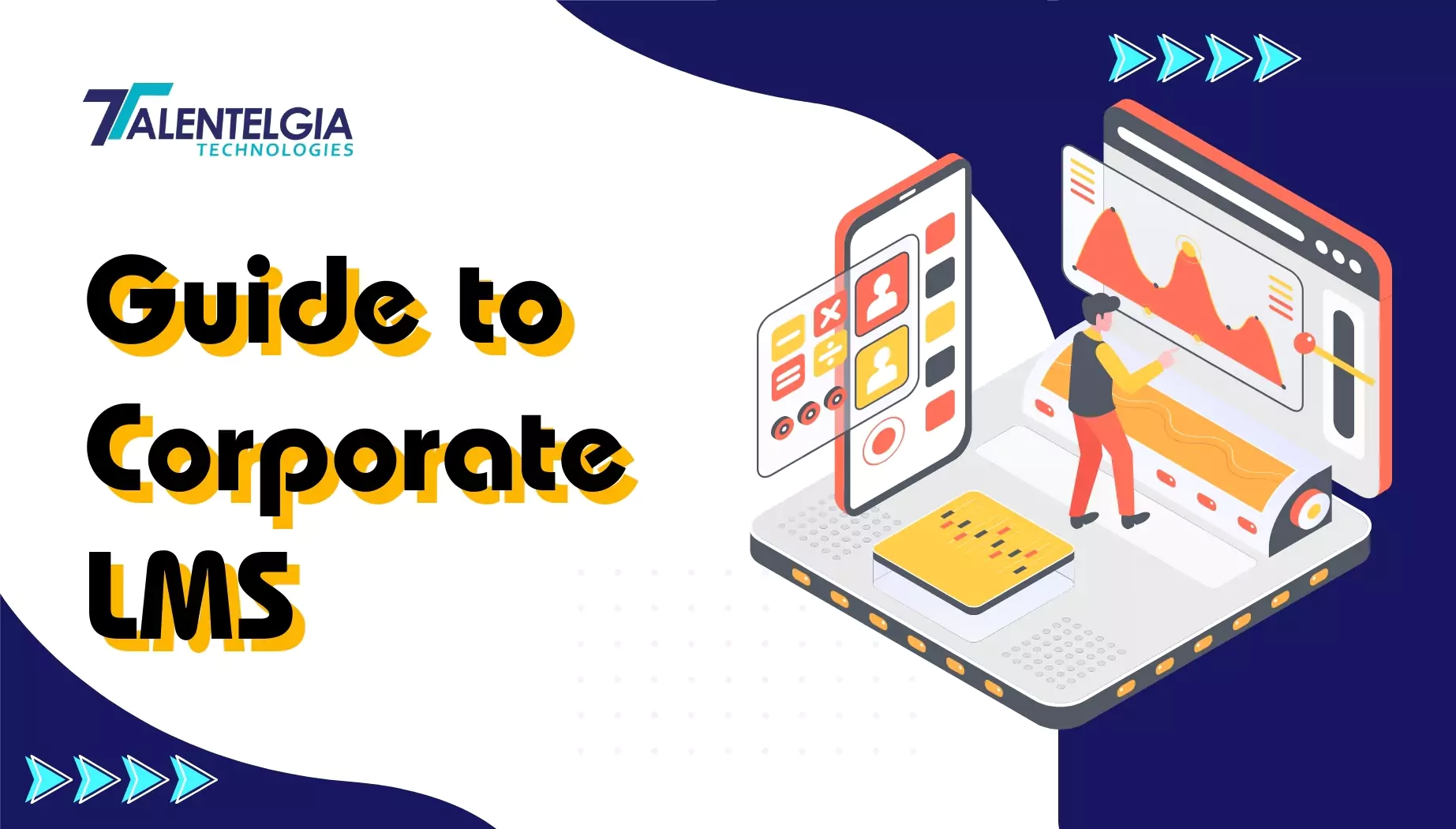




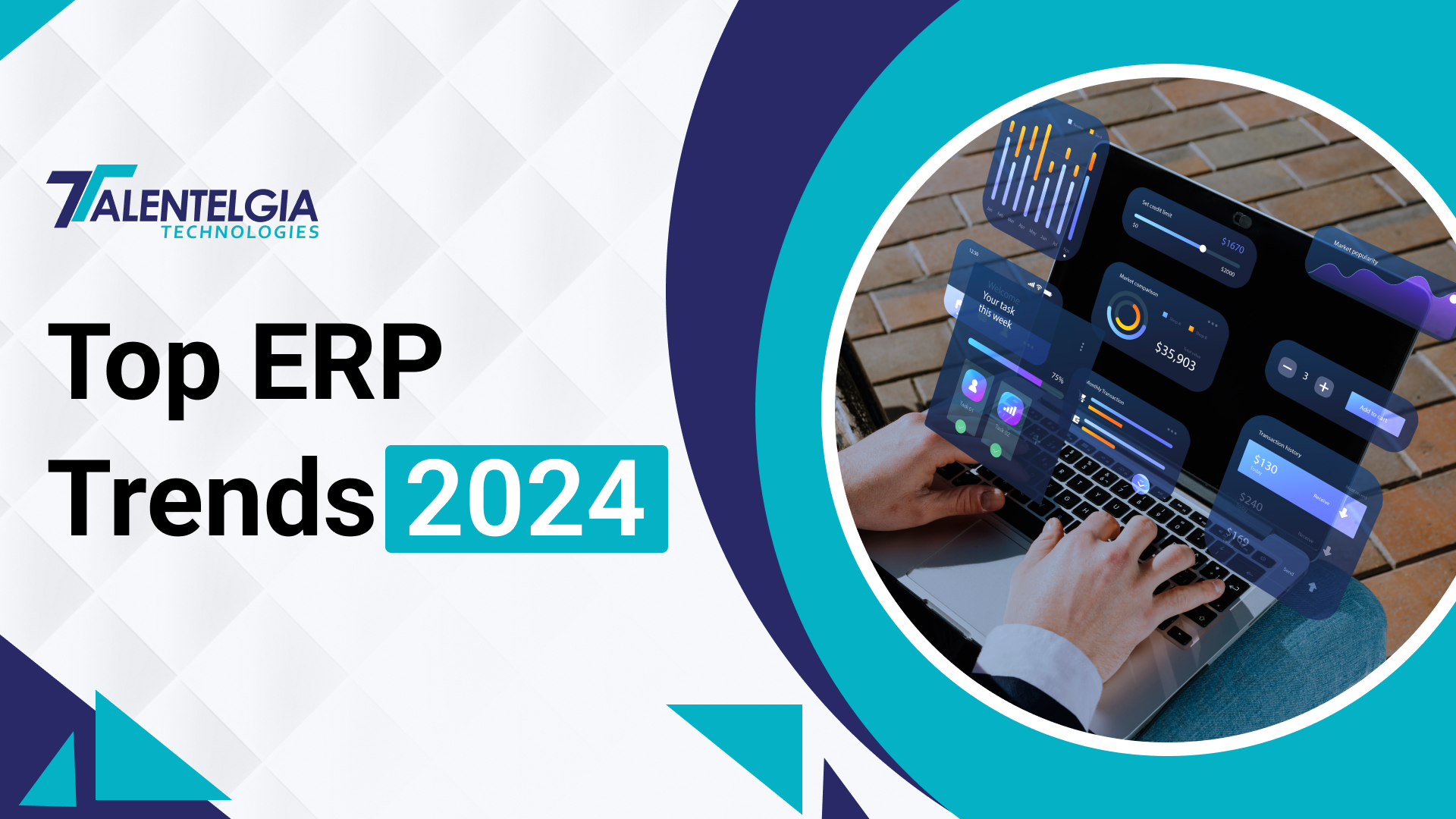











 Write us on:
Write us on:  Business queries:
Business queries:  HR:
HR: 




